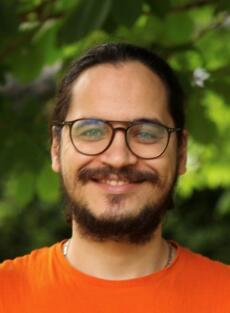Education
- Since 2018:
PhD studies in the Molecular Evolution and Sociobiology Group, Institute for Evolution and Biodiversity, University of Münster, Germany
- 2016:
Master of Science (M.Sc.) in Microbial Biotechnology with honors, Sidi Mohamed Ben Abdellah University, Fez, Morocco
- 2014:
Bachelor of Science (B.Sc.) in Life Sciences, Biology and Health with honors, Sidi Mohamed Ben Abdellah University, Fez, Morocco
Work experience
- 2016 - 2018:
Responsible at an organisation managing public health insurance, Morocco
Supervisors
- Prof. Dr. Jürgen Gadau, Institute for Evolution and Biodiversity, Molecular Evolution and Sociobiology, University of Münster, Germany
- PD Dr. Jan Oettler, Lehrstuhl für Zoologie/Evolutionsbiologie, University of Regensburg, Germany
- Dr. Lukas Schrader, Institute for Evolution and Biodiversity, Molecular Evolution and Sociobiology, University of Münster, Germany
Research interests
-
Adaptive evolution
-
Phenotypic plasticity
-
Population genomics
PhD project description
Rapid adaptive change through high recombination rate and rearrangement in the invasive species Cardiocondyla obscurior.
The success of invasive species has fascinated evolutionary biologists for decades due to their ecological and economic impacts. As a consequence of genetic bottlenecks, invasive species often have a reduced genetic variation following introduction. In spite of this limited genetic variation, which is known to be a limiting factor in species adaptation and evolution, invasive species can rapidly colonize and adapt to new habitats. This raises the question of how successful invaders cope with this supposedly detrimental low genetic variation following introduction. During invasion, populations experience large environmental changes that may facilitate species adaptation by inducing structural and functional variations. This may occur via interaction with structural units such as transposable elements. Intriguingly, invasive species such as ants and other social Hymenoptera have the highest rates of recombination and genomic rearrangements in all animals studied so far. However, the role of these processes in the rapid adaption of these species is still poorly understood. This PhD project will contribute to our understanding of how invasive species deal with environmental constraints during invasion despite their low genetic variation. Furthermore, this project will improve our understanding of the relationship between genetic variation, recombination and transposable elements.
Publications
- Errbii M, Keilwagen J, Hoff KJ, Steffen R, Altmüller J, Oettler J, Schrader L (2021) Transposable elements and introgression introduce genetic variation in the invasive ant Cardiocondyla obscurior. Molecular Ecology 30:6211-6228. 10.1111/mec.16099 [doi]
- Schrader L, Winter M, Errbii M, Delabie J, Oettler J, Gadau J (2021) Inhibition of HSP90 causes morphological variation in the invasive ant Cardiocondyla obscurior. Journal of Experimental Zoology Part B: Molecular and Developmental Evolution 336:333-340. 10.1002/jez.b.23035 [doi]
- Dennis AB, Ballesteros GI, Robin S, Schrader L, Bast J, Berghöfer J, Beukeboom LW, Belghazi M, Bretaudeau A, Buellesbach J, Cash E, Colinet D, Dumas Z, Errbii M, Falabella P, Gatti JL, Geuverink E, Gibson JD, Hertaeg C, Hartmann S, Jacquin-Joly E, Lammers M, Lavandero BI, Lindenbaum I, Massardier-Galata L, Meslin C, Montagné N, Pak N, Poirié M, Salvia R, Smith CR, Tagu D, Tares S, Vogel H, Schwander T, Simon JC, Figueroa C, Vorburger C, Legeai F, Gadau J (2020) Functional insights from the GC-poor genomes of two aphid parasitoids, Aphidius ervi and Lysiphlebus fabarum. BMC Genomics 21(1):376. 10.1186/s12864-020-6764-0 [doi]

![]()